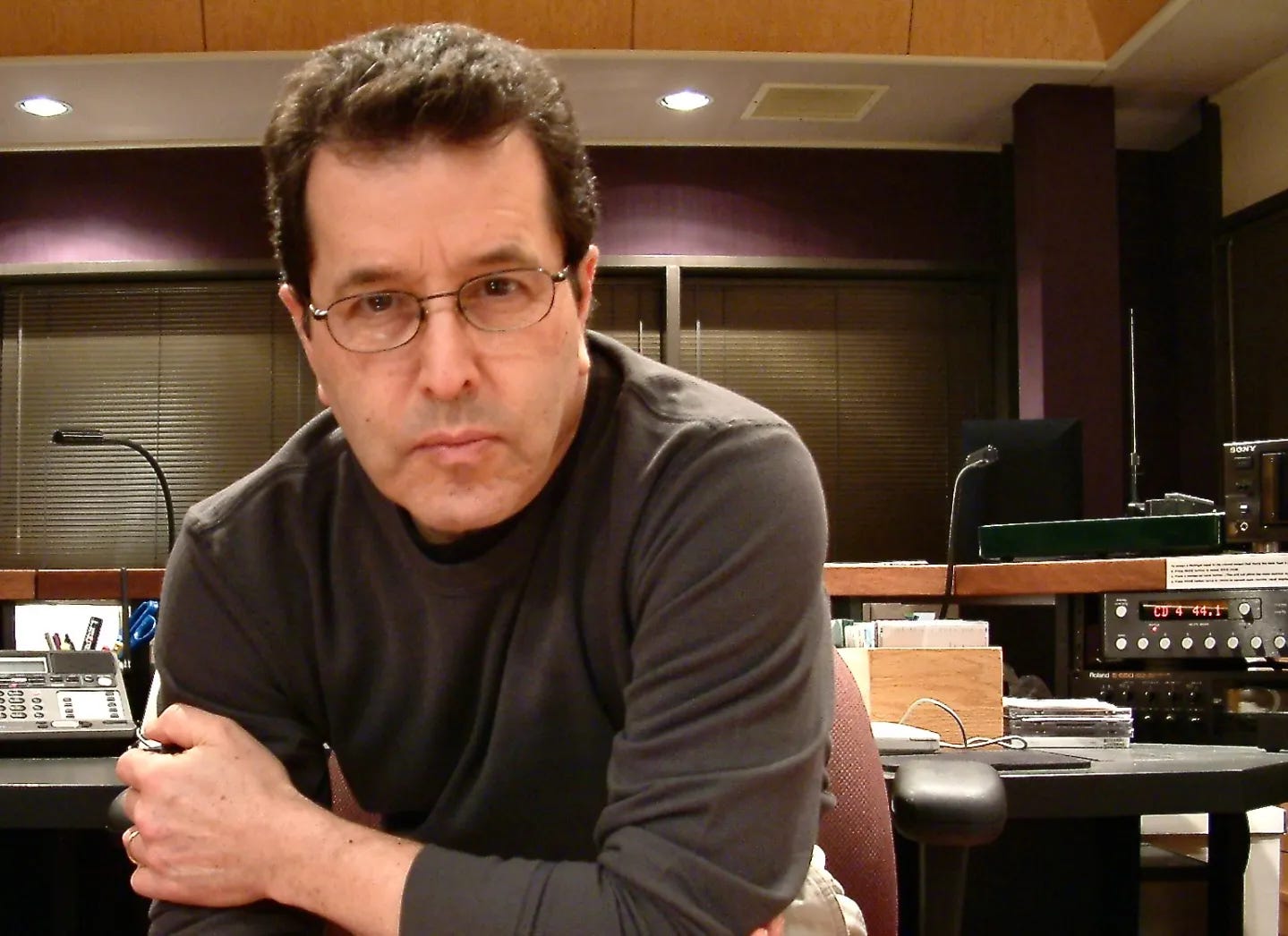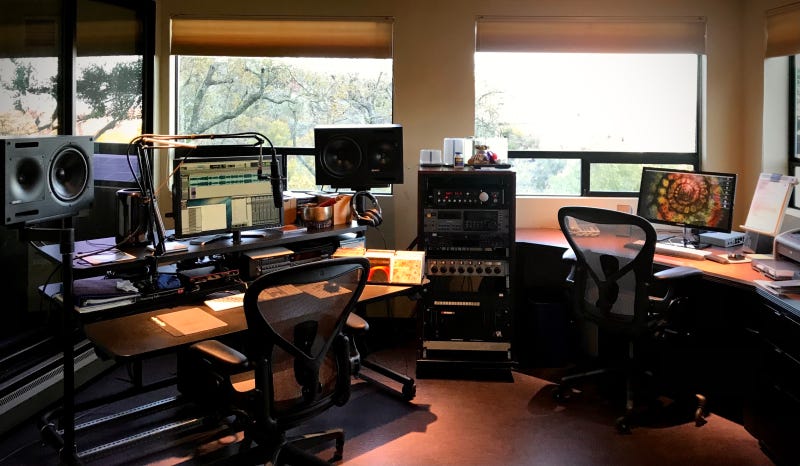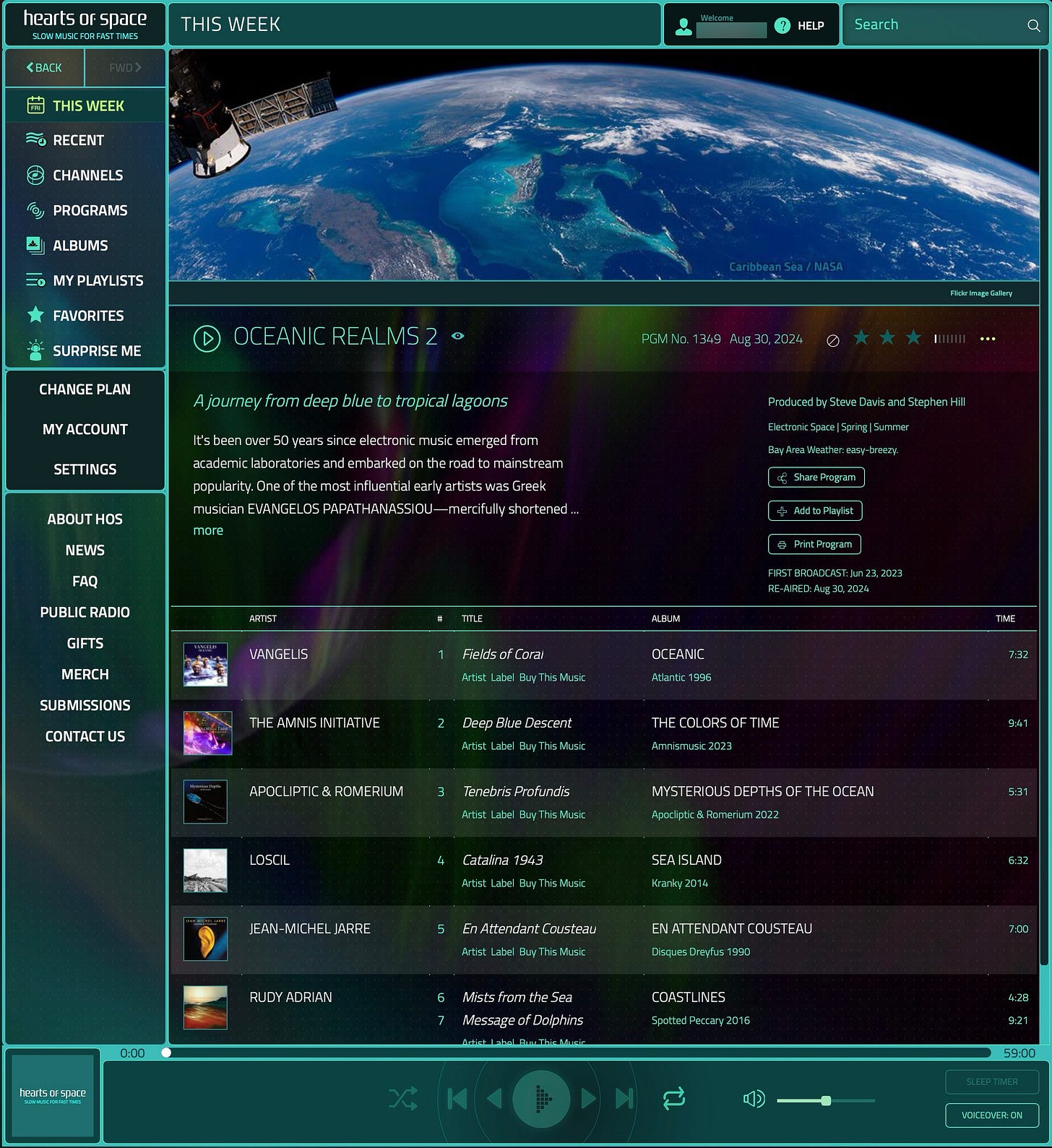Creating content for the AI for Lifelong Learners podcast is more than just a task—it’s a personal mission. I’m driven to uncover and share stories where AI leads someone to think differently, to view life from a completely new perspective because of this technology. Amidst the often gloomy discourse surrounding AI, it’s important to remember that at its core, AI is just software running on a machine. The real question we should be asking is: how can AI empower us to live more expansive, enriched lives?
Today’s episode is a perfect example of why I dedicate myself to writing and producing shows for AI for Lifelong Learners. Get ready for an extraordinary journey where ambient music converges with cutting-edge technology. We are joined by Stephen Hill, the legendary creator of Hearts of Space—a program that has been the soundtrack to our dreams and a source of tranquility for over four decades.
But this isn’t just another interview about music. If you’re not familiar with Hearts of Space, set aside any preconceived notions you might have about ambient space music. This is a story of innovation, resilience, and the surprising ways AI is transforming art, pushing the boundaries of creativity, and helping us transcend human limitations.
Here's why this episode is a must-listen:
A Voice Reborn: Discover how AI voice cloning is allowing Stephen to continue his iconic narration despite health challenges, opening up new possibilities for artists and creators facing similar issues.
Behind the Curtain: Get an exclusive peek into the meticulous curation process that makes each Hearts of Space episode a unique journey through sound.
AI in Art: Explore the potential impact of AI on music creation and curation, including insights from renowned ambient musician Robert Rich.
The Human Touch: Learn why, in an age of algorithms, Stephen believes human taste remains irreplaceable in creating truly meaningful musical experiences.
Lifelong Innovation: Be inspired by Stephen's 40+ year journey of continuous adaptation, from radio to streaming, showcasing the power of lifelong learning.
Whether you're a long-time "Space Fan" or new to the world of ambient music, this episode offers an engaging look at the intersection of art, technology, and human creativity. Join us for a conversation that will change the way you think about music, AI, and the future of human expression.
Tune in and discover why, in Stephen's words, Hearts of Space offers "slow music for fast times."
As background for the curious:
This episode has been months in the making. It began with a simple letter I wrote to Stephen Hill, inquiring about the possibility of an interview. I had no idea where this would lead. My motivation was pure admiration for his dedication in producing Hearts of Space for over four decades. The Hearts of Space streaming website stands out for its lack of intrusive advertising, and each hour-long program is free from sponsor interruptions. Since 2001, the show has been supported almost entirely by subscriptions. Every episode is a unique, hand-crafted, and beautifully produced experience. And of course, each show is graced by Stephen Hill's distinctively soothing and velvety cool introductions and conclusions.
More information on Heats of Space - HOS.com
For those interested in delving deeper into the world of ambient music and Hearts of Space, I recommend two resources. First, a recent article by Daniel Bromfield in the Marin Independent Journal titled "Hearts of Space offers 'slow music for fast times." This piece provides insight into the show's enduring appeal. Additionally, for a broader perspective on the genre's evolution and its cultural context, Victor Szabo's book "Turn On, Tune In, Drift Off: Ambient Music's Psychedelic Past" explores the fascinating intersection of ambient music, counterculture attitudes, and the shifting landscape of musical experience. These resources offer valuable context for understanding the significance of Hearts of Space and its place in the ambient music ecosystem.
Transcript of Interview with Stephen Hill
Introduction
Tom Parish: To the listeners of this show, I'm going to take a moment and explain a few things. I have the unique pleasure of welcoming Stephen Hill, host of the Hearts of Space show to AI for Lifelong Learners.
For those who may not be familiar, Hearts of Space is a long-time public radio program and streaming website featuring ambient space and contemplative music. Now, this isn't the kind of ambient music you might be thinking of, if you're not familiar with Hearts of Space.
For those who know Stephen, and there are many of us around the world, there's something magical about the way Stephen curates each weekly show. Each one is very, very unique, which could be described as a soundtrack for dreams or a source of calm during stressful times. In short, mind-expanding.
The soothing atmosphere Stephen creates with his knowledgeable delivery style is what we all look forward to each week along with his signature closing sign-off. I admire his creativity and have been eager to connect with him on a more personal level, to gain a deeper understanding of the passion and inspiration behind Hearts of Space.
But it wasn't so easy. It turned out, this is the first time I've interviewed a man I've never met or ever talked to. So with that, let's begin.
Stephen, thank you for being on the show today with me.
Stephen Hill: Thank you, Tom. I'm grateful for your praise of Hearts of Space and my work over the last five decades to provide a platform for ambient space and contemplative music. It's been a genuine labor of love, and I've been fortunate to be able to follow my musical interests and, with the help of my original co-producer, Anna Turner, my wife Leyla, who handles all our administration, business affairs and customer service, and my associate producer, Steve Davis, to create first a radio program and now an online streaming service to deliver the music to sympathetic listeners like you.
Q&A
Tom Parish: Stephen, the Hearts of Space show is 41 years old with over 1,370 weekly programs. Time has passed and I understand you have some challenges facing you. And in fact, this is what brought us together. Given my interest in seeing how AI technology is making a difference in people's lives, I proposed doing this show with you thinking you might be using some AI tool for your audio production. To my great surprise, you expressed interest, but you had reservations about talking nonstop for an hour-long interview. That would be too challenging, especially for your voice. I was a bit perplexed about that, but then we had a discussion and the idea of producing this show came to light, doing it a bit differently using some unique technology. Stephen, take it from here. Explain more what we decided to do.
Stephen Hill: What Tom is referring to is a problem I've been having with the quality and stamina of my voice, which has been deteriorating slowly for over 10 years. Originally, I ascribed it to age, but in 2016 I was diagnosed with Parkinson's, and progressive voice weakness is one of the common symptoms.
In 2023, I started hearing about what's called “text-to-speech” software built on AI and a company that was pushing the state-of-the-art called ElevenLabs. That's what I'm using to speak to you now. I type my answer, input the text online, and the AI uses a high-quality clone trained on my voice in its prime to generate the audio.
So here's the story of how Tom and I decided to use AI audio software to produce my side of this show.
[Stephen continues to explain the history of Hearts of Space and his personal health challenges]
Tom Parish: Well, thank you, Stephen. That's so very kind of you. This project has just been a joy. Starting back with KPFA, and then into a national syndication for Hearts of Space. What was your initial inspiration for doing this show? Was it difficult at first, or easy, or some kind of unique challenge? I'm very curious.
Stephen Hill: In retrospect, even though I had a natural attraction to contemplative sound experiences, it's clear that marijuana, mescaline, LSD, and other psychoactive, perception-enhancing drugs drove the musicians, the audience, my original co-producer, Anna Turner, and me in this direction. When the show was established in 1973, psychedelics were peaking and massively influential.
[Stephen continues to explain the origins and evolution of the show]
Tom Parish: How did the contemplative sound experience evolve? This is something that I assume occurred over a number of years.
Stephen Hill: Contemplative music is an extremely old genre. I think it goes back to before history, to primitive instruments in resonant caves. Today, it has traditions, relationships, and financial structures that are more like a religious, charitable, or nonprofit organization.
[Stephen elaborates on the evolution and current state of contemplative music]
Tom Parish: Stephen, would you be willing to share your process of how you select artists and themes for each show? Is it a team effort? I want to add here as background, what is most noteworthy about the weekly program is the calm, thoughtfully created, and context specific introductions you provide. I look forward to those every week. The way you tailor each introduction to contemplate the show's theme and evoke specific emotions, each one is uniquely different, yet carefully crafted to fit the nature of the weekly program title and the songs assembled for the program. Talk more about this.
Stephen Hill: Sure. When we launched the syndicated show in 1983, we made the decision to organize the shows around themes. This led us to create focused sub-genres, which today have become 30 categories on our streaming service.
[Stephen explains the process of creating each show with his team]
Tom Parish: Something I want to mention here is that Hearts of Space does not offer any algorithmic prediction or personalization running in the background. I don't have a problem with that at all. In fact, I rather like it, really. I find there's a benefit in curating my own list and enjoying the discovery of new artists that way. For the masses using Spotify and Apple Music, this is not the norm. What are your thoughts on this?
Stephen Hill: It's a fair question, but I haven't given it a great deal of thought at this point. If you use what happened with ChatGTP and Text as an example, AI-based tools should make it possible for average listeners without any formal musical training to compose their own ambient, space, and contemplative music by writing effective prompts and letting an AI trained on key historical examples of the genres create the audio.
[Stephen discusses the potential impact of AI on music creation and curation]
Tom Parish: Have you had conversations with the artists that you use about the use of AI and the impact of AI on their creativity? This is not from the perspective of AI creating music start to finish. I don't think that's relevant and the results to date are so poor. But I am curious about the subtle creative impact of various AI tools on the process of evolving new musical ideas and how that impacts the production of new songs.
Stephen Hill: AI could certainly have a creative impact on lyrics for songs and also on the composition of instrumental music. And there is an existing class of experimental music composers who no doubt are already embracing AI. These composers typically value novelty over listenability. That said, I have not had any significant discussions with artists about this.
[Stephen shares insights from ambient musician Robert Rich on the topic of AI in music creation]
Tom Parish: So, Stephen, back to you. Tell us something that you think the listeners should know with regards to Hearts of Space and why it's so important.
Robert Rich: There are now literally thousands of sources of quiet, relaxing music available as playlists on the big streaming services, as long-form videos on YouTube, and even in dedicated apps like Calm, which has millions of users. From the beginning, the most salient characteristic and marketing handle of New Age music was that it was relaxing. As a person, I'm all for relaxation, but as a programmer, not at the expense of musical quality.
What I think set Hearts of Space apart from the beginning is that the music we program, while having many of the characteristics you mention, also meets a high critical standard of musical skill and quality. So we look for something that's physically relaxing while being musically stimulating, or at least worth considering from an artistic point of view. And we are also aware that there is a spiritual dimension to music that is not measurable, has nothing to do with relaxation, and is much more important.
As one reviewer put it about Hearts of Space years ago, "The music is better, a lot better."
Tom Parish: And in closing, if you're willing, would you provide us with your iconic sign-off please?
Stephen Hill: Join me again for more “slow music for fast times” … on Hearts of Space. Safe journey, space fans, wherever you are.
Tom Parish: Thank you so much, Stephen, for your time and thoughtful replies on the history of Hearts of Space and where you are today with it. And most of all, for being willing to just stay with it all these years and continue to provide an inspiration of creativity for us in a way that's extremely unique and extremely important for our own sanity.
Credits and Acknowledgments
Stephen Hill for his creativity and authenticity of self at https://hos.com
Music licensed through https://artist.io via Music & SFX Pro subscription
Music graciously provided by Robert Rich Waves Now - Galvanic Response and from Traveler’s Cloth - Looms of Origin
Paul Avgerinos a master of beautiful music for his willingness to support this effort.
Special thanks Joel Block for his friendship, mentorship and guidance over the years
Larry Seyer for helping with some unique EQ issues on this show















Share this post